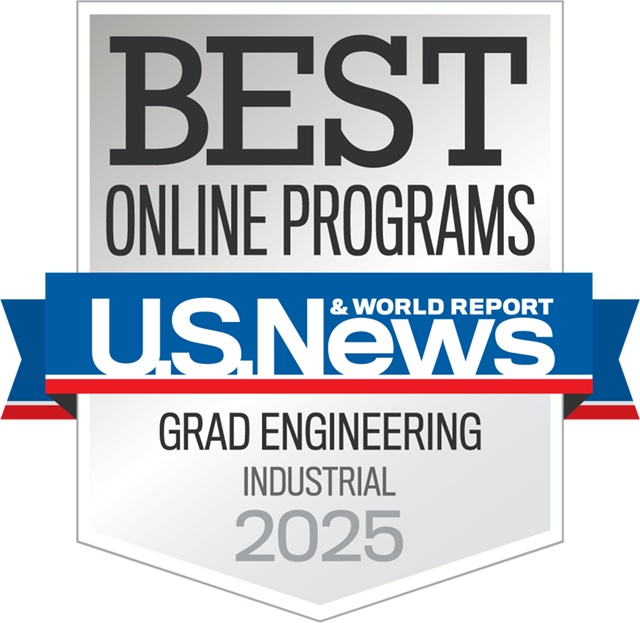100% Online
Complete your Penn State course work at your own pace and 100% online.
Application deadline
Credits and costs
Nationally Recognized

Gain Skills for an In-Demand Field
Build, refine, and integrate efficient systems in manufacturing, information technology, consumer products, equipment, and workplace dynamics.
Lead groups in fields like electronic and aerospace manufacturing, shipping logistics, supply chain management, and health care and human services.
Combine math, science, business, and psychology to improve efficiency, performance, quality, and safety, while simultaneously reducing cost and waste.
Apply engineering design to produce solutions that meet specified needs with consideration of public health, safety, and welfare, as well as global, cultural, social, environmental, and economic factors.
Immerse Yourself in Online Industrial Engineering Courses
Immerse Yourself in Online Industrial Engineering Courses
The 30-credit industrial engineering program, offered online through Penn State World Campus in partnership with the Penn State College of Engineering, is largely based in math and science, with opportunities to study business and psychology.
You must successfully complete 30 course credits at the 400-, 500-, or 800-level, of which 21 course credits must be earned at Penn State (i.e., only 9 credits can be transferred from other institutions). In addition:
- All students must successfully complete 3 credits of IE 894: Capstone Design.
- At least 18 credits must be in 500-level or higher courses (including IE 894).
- At least 15 credits must be in 500-level or higher IE courses (including IE 894).
- At least 21 credits of the 30 credits must be IE courses (including IE 894).
The Master of Engineering in Industrial Engineering has limited formal course requirements; you and your adviser can tailor the program specifically to suit your needs and educational goals by choosing from the following list of courses.
Courses
- 3credits
Concepts and techniques of analyses useful in evaluating engineering projects under deterministic and uncertain conditions.
- 3credits
Introduction to retail services operations, process models, and application of information technologies to enhance productivity and profitability.
- 3credits
Consumer product design for a global market, incorporating human factors principles and user desires in a multicultural perspective.
- 3credits
An accelerated treatment of the main theorems of linear programming and duality structures plus introduction to numerical and computational aspects of solving large-scale problems.
- 3credits
Statistical design and analysis of experiments in engineering; experimental models and experimental designs using the analysis of variance.
- 3credits
Study of stochastic processes and their applications to engineering and supply chain and information systems.
- 4credits
Comprehensive study of the fundamentals, process characteristics, economics, and practical applications of various additive manufacturing processes.
- 3credits
Structure and biomechanics of bone, cartilage, and skeletal muscle; dynamics and control of musculoskeletal system models.
- 3credits
Physics and physiology of humans at work; models of muscle strength, dynamic movements; neural control; physical work capacity; rest allocation.
- 3credits
Design and programming of simulations that facilitate human control, real-time discrete-event simulation, supervisory control of dynamic system.
- 3credits
Information processing and decision making models of the human in the modern workplace, emphasizing visual inspection and other industrial applications.
- 3credits
Materials processing and manufacturing methods for engineering materials; manufacturing process modeling and control; manufacturability of engineering materials.
- 3credits
Survey course on the key topics in predictive analytics. Students will learn methods associated with data analytics techniques and apply them to real examples using the R statistical system.
Electives
Students may select from a list of elective courses maintained by the program. This list may change over time in response to market demand. Students may also use the graduate certificate courses in Additive Manufacturing and Design, Supply Chain Management, and Engineering Leadership and Innovation Management. If you would like to add one of these credentials to your transcript and have questions about the application process, please contact the program at [email protected] for assistance to discuss your options and view the most up-to-date list.
Culminating Project and Research (3 credits)
- 3credits
Students will apply the analytical and design skills learned in previous courses to solve an industrial problem based on their workplace or industrial partner. Students who do not have an identifiable work-related problem will work collaboratively with the instructor to develop a suitable topic. This is an individual project culminating in a final report.
Course Availability
If you're ready to see when your courses will be offered, visit our public LionPATH course search (opens in new window) to start planning ahead.
Advance Your Career

Advance Your Career
You can use the knowledge gained from this program and the support of Penn State career resources to pursue careers in a variety of fields, depending on your goals.
Job Titles Related to This Degree
The following roles are often held by people with this type of degree:
- Human Factors Engineer
- Lean Manufacturing Engineer
- Process Engineering Manager
- Process Improvement Engineer
- Quality Control Systems Manager
Employment Outlook for Occupational Fields Related to This Degree
Estimates of employment growth and total employment are provided by the U.S. Bureau of Labor Statistics and are subject to change. While these occupations are often pursued by graduates with this degree, individual outcomes may vary depending on a variety of factors. Penn State World Campus cannot guarantee employment in a given occupation.
Industrial Engineers
Architectural and Engineering Managers
Industrial Production Managers
Career Services to Set You Up for Success

From the day you're accepted as a student, you can access resources and tools provided by Penn State World Campus Career Services to further your career. These resources are beneficial whether you're searching for a job or advancing in an established career.
- Opportunities to connect with employers
- Career counselor/coach support
- Occupation and salary information
- Internships
- Graduate school resources
Ready to Learn More?
Get the resources you need to make informed decisions about your education. Request information on this program and other programs of interest by completing this form.
Ready to take the next step toward your Penn State master's degree?
Costs and Financial Aid
Costs and Financial Aid
Learn about this program's tuition, fees, scholarship opportunities, grants, payment options, and military benefits.
Costs and Financial Aid
Graduate Tuition
Graduate tuition is calculated based on the number of credits for which you register. Tuition is due shortly after each semester begins and rates are assessed every semester of enrollment.
2024–25 Academic Year Rates
| How many credits do you plan to take per semester? | Cost |
|---|---|
| 11 or fewer | $1,027 per credit |
| 12 or more | $12,325 per semester |
2025–26 Academic Year Rates
| How many credits do you plan to take per semester? | Cost |
|---|---|
| 11 or fewer | $1,037 per credit |
| 12 or more | $12,448 per semester |
Financial Aid and Military Benefits
Some students may qualify for financial aid. Take the time to research financial aid, scholarships, and payment options as you prepare to apply. Federal financial aid may only be used to pay for credits used to satisfy program requirements.
Military service members, veterans, and their spouses or dependents should explore these potential military education benefits and financial aid opportunities, as well.
Additional Cost of Attendance Details
To view the detailed list of cost of attendance elements:
- visit the Tuition Information site
- click the plus sign to expand the table
- select a semester from the World Campus row
Technical Requirements
Review the technical requirements for this program.
Who Should Apply?
This program is designed for working professionals who hold bachelor's degrees in engineering and want to enhance their knowledge and skills to advance their careers.
Set Your Own Pace

Set Your Own Pace
Whether you are looking to finish your program as quickly as possible or balance your studies with your busy life, Penn State World Campus can help you achieve your education goals. Many students take one or two courses per semester.
Our online courses typically follow a 12- to 15-week semester cycle, and there are three semesters per year (spring, summer, and fall). If you plan to take a heavy course load, you should expect your course work to be your primary focus and discuss your schedule with your academic adviser.
To Finish Your Degree in One to Two Years
- Take 3–4 courses each semester
To Finish Your Degree in Two to Three Years
- Take 2–3 courses each semester
To Finish Your Degree in Three to Four Years
- Take 1 course each semester
Timelines may vary based on course availability.
Convenient Online Format
This program's convenient online format gives you the flexibility you need to study around your busy schedule. You can skip the lengthy commute without sacrificing the quality of your education and prepare yourself for more rewarding career opportunities without leaving your home.
A Trusted Leader in Online Education

Penn State has a history of more than 100 years of distance education, and World Campus has been a leader in online learning for more than two decades. Our online learning environment offers the same quality education that our students experience on campus.
Information for Military and Veterans

Are you a member of the military, a veteran, or a military spouse? Please visit our military website for additional information regarding financial aid, transfer credits, and application instructions.
How to Apply to Penn State

How to Apply to Penn State
Apply by July 15 to start August 25
Application Instructions
Deadlines and Important Dates
Complete your application and submit all required materials by the appropriate deadline. Your deadline will depend on the semester you plan to start your courses.
Fall Deadline
Apply by July 15 to start August 25Spring Deadline
Apply by December 1 to start January 12Summer Deadline
Apply by March 15, 2026, to start May 18, 2026
Steps to Apply
For admission to the J. Jeffrey and Ann Marie Fox Graduate School, an applicant must hold either (1) a bachelor of science degree in a suitable engineering field from a regionally accredited U.S. institution or (2) a tertiary (postsecondary) degree that is deemed comparable to a four-year bachelor's degree from a regionally accredited U.S. institution. This degree must be from an officially recognized degree-granting institution in the country in which it operates.
For admission to the program, a 3.0 grade-point average (or equivalent) is needed. Exceptions to the minimum 3.0 GPA may be made for students with special backgrounds, abilities, and interest. A minimum of 2–3 years relevant work experience is recommended.
Applications are submitted electronically and include a nonrefundable application fee. You will need to upload the following items as part of your application:
Official transcripts from each institution attended, regardless of the number of credits or semesters completed. Transcripts not in English must be accompanied by a certified translation. If you are a Penn State alum, you do not need to request transcripts for credits earned at Penn State but must list Penn State as part of your academic history.
GPA and Test Scores — Postsecondary (undergraduate), junior/senior (last two years) GPA is required. Official GRE or GMAT test scores will be considered if submitted but are NOT required.
English Proficiency — The language of instruction at Penn State is English. With some exceptions, international applicants must take and submit scores for the Test of English as a Foreign Language (TOEFL) or International English Language Testing System (IELTS). Minimum test scores and exceptions are found in the English Proficiency section on the Fox Graduate School's "Requirements for Graduate Admission" page. Visit the TOEFL website for testing information. Penn State's institutional code is 2660.
References (3) — You will need to initiate the process through the online application by entering names, email addresses, and mailing addresses of three references. Upon submission of your application, an email will be sent to each reference requesting they complete a brief online recommendation regarding your commitment for success in an online program. Please inform all recommenders they must submit the form in order for your application to be complete.
Program-Specific Questions/Materials
Personal Statement — A one- to two-page statement of purpose outlining personal career goals and reasons for wanting to enroll in the program. This statement should be specific and include information about your short- and long-term goals and how enrolling in the program may help to achieve them. The statement of purpose also offers you the opportunity to demonstrate your writing and communication skills, specify examples of leadership, and provide pertinent information that will assist the committee in selecting candidates who can benefit from and contribute to the industrial engineering program.
To begin the online application, you will need a Penn State account.
Create a New Penn State Account
If you have any problems during this process, contact an admissions counselor at [email protected].
Please note: Former Penn State students may not need to complete the admissions application or create a new Penn State account. Please visit our Returning Students page for instructions.
You can begin your online application at any time. Your progress within the online application system will be saved as you go, allowing you to return at any point as you gather additional information and required materials.
- Choose Enrollment Type: "Degree Admission"
- Choose "WORLD CAMPUS" as the campus
Checking Your Status
You can check the status of your application by using the same login information established for the online application form.5. Complete the application.
Admissions Help
If you have questions about the admissions process, contact an admissions counselor at [email protected].
Contact Us

Contact Us
Have questions or want more information? We're happy to talk.
To learn more about the Penn State World Campus Master of Engineering in Industrial Engineering, please contact:
Ling Rothrock
College of Engineering
[email protected]
Phone: 814-863-2361
Learn from the Best
Learn from the Best
The Penn State World Campus Master of Engineering in Industrial Engineering is offered in partnership with the Penn State College of Engineering.
Faculty
Ling Rothrock
- DegreePh.D., Industrial Engineering, Georgia Institute of Technology
- DegreeM.S., Industrial Engineering, Georgia Institute of Technology
- DegreeB.S., Applied Mathematics, Florida Institute of Technology
Dr. Ling Rothrock is a professor in the industrial and manufacturing engineering department. He leads the Human Performance and Assessment Lab. Dr. Rothrock's research interests include human-in-the-loop discrete event simulations, display visualization, and human-machine performance evaluation.
Sanjay Joshi
- DegreePh.D., Industrial Engineering, Purdue University
- DegreeM.S., Industrial Engineering, SUNY Buffalo
- DegreeB.E., Production Engineering, University of Bombay
Dr. Sanjay Joshi is a professor of industrial and manufacturing engineering. His research and teaching interests are in the areas of computer-aided design and manufacturing (CAD/CAM), with specific focus on computer-aided process planning, additive manufacturing, control of automated flexible manufacturing systems, and topics in advanced manufacturing.
Vittaldas Prabhu
- DegreePh.D., Mechanical Engineering, University of Wisconsin – Madison
- DegreeM.S., Mechanical Engineering, University of Wisconsin – Madison
- DegreeM.S., Manufacturing Systems Engineering, University of Wisconsin – Madison
- DegreeB.E., Instrumentation Technology, (Electrical Engineering), Bangalore University
Dr. Vittaldas Prabhu is a professor of industrial and manufacturing engineering. His research and teaching interests are in the areas of manufacturing and service enterprises with focus on distributed control, computing and information systems, and modeling their dynamics.
Jose Ventura
- DegreePh.D., Industrial and Systems Engineering, University of Florida
- DegreeM. Eng., Industrial and Systems Engineering, University of Florida
- DegreeB.S., Industrial Engineering, Polytechnic University of Catalunya (Spain)
Dr. Jose Ventura is professor, Dean’s Fellow, and chair of the Interdisciplinary Operations Research Graduate Program in the Harold and Inge Marcus Department of Industrial and Manufacturing Engineering. Dr. Ventura, an IISE Fellow, focuses his research interests on logistics and supply chain management, applied operations research, revenue management, and design and analysis of energy and environmental systems.
Robert Voigt
- DegreePh.D., Metallurgical Engineering, University of Wisconsin – Madison
- DegreeM.S., Metallurgical Engineering, University of Wisconsin – Madison
- DegreeB.S., Mechanical Engineering, University of Wisconsin – Madison
Dr. Robert Voigt is a professor of industrial engineering, with research interests in the area of improved processing and properties of engineering alloys. He works collaboratively with industry/government/university research consortia focused in the areas of metal casting, welding, heat treatment, machining, and improving the environmental and economic sustainability of manufacturing operations.
Hui Yang
- DegreePh.D., Industrial Engineering and Management, Oklahoma State University
- DegreeM.S., Electrical and Computer Engineering, China University of Mining and Technology (Beijing)
- DegreeB.S., Electrical and Computer Engineering, China University of Mining and Technology (Beijing)
Dr. Hui Yang is the Harold and Inge Marcus Career Associate Professor in the Harold and Inge Marcus Department of Industrial and Manufacturing Engineering. He heads the Complex Systems Monitoring, Modeling, and Control lab at Penn State, and he is PI and site director of Penn State's National Science Foundation Center for Health Organization Transformation. Dr. Yang's research interests focus on sensor-based modeling and analysis of complex systems for process monitoring, process control, system diagnostics, condition prognostics, quality improvement, and performance optimization.
News


